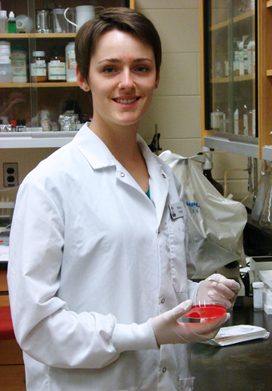"When I saw the words ‘congratulations' and ‘accepted,' I sat at my computer feeling stunned, and I laughed and cried all at the same time," she says. "It was the first time I had accomplished a major, long term goal and it felt good."
Now finished her first year of studies, Wheler is spending her summer working on a dairy research project with Dr. Chris Luby, an assistant professor in the WCVM's Department of Large Animal Clinical Sciences.
"I'm looking at the safety and efficacy of a novel treatment for mastitis caused by Staphylococcus aureus," explains Wheler, adding that the results of the study will have an impact on how veterinarians deal with S. aureus mastitis – a widespread and costly disease in the dairy industry.
The new treatment has been tested in a number of human medicine studies. It has been found to have healing properties through its ability to promote cell repair and regeneration.
Screening animals, treating them, running milk cultures, data entry and data analysis are just a few of the responsibilities that Wheler has taken on for this project.
Originally from Moose Jaw, Sask., Wheler has grown up with animals playing a major role in her life. "I've always had a family dog or two in the household, and I've volunteered at a variety of places including a mixed animal practice, a rescue farm, the human society and a backyard rehabilitation program," she says.
Wheler also worked at the University of Saskatchewan dairy farm for two years. While there, she took part in a cattle nutrition study and was responsible for feeding and caring for the cows involved in the project.
This experience led to Wheler developing a strong interest in dairy medicine. "In the future, I see myself working at a mixed animal practice with a particular emphasis on dairy cattle," she says.
After only one month of participating in the College's undergraduate summer research program, Wheler already considers her experience to be invaluable, especially if she decides to pursue research as a career later on in life.
"It's been great to learn more about the research process during my summer break," she says. "It's an ideal way to discover another facet of the veterinary profession outside of private practice."
Now finished her first year of studies, Wheler is spending her summer working on a dairy research project with Dr. Chris Luby, an assistant professor in the WCVM's Department of Large Animal Clinical Sciences.
"I'm looking at the safety and efficacy of a novel treatment for mastitis caused by Staphylococcus aureus," explains Wheler, adding that the results of the study will have an impact on how veterinarians deal with S. aureus mastitis – a widespread and costly disease in the dairy industry.
The new treatment has been tested in a number of human medicine studies. It has been found to have healing properties through its ability to promote cell repair and regeneration.
Screening animals, treating them, running milk cultures, data entry and data analysis are just a few of the responsibilities that Wheler has taken on for this project.
Originally from Moose Jaw, Sask., Wheler has grown up with animals playing a major role in her life. "I've always had a family dog or two in the household, and I've volunteered at a variety of places including a mixed animal practice, a rescue farm, the human society and a backyard rehabilitation program," she says.
Wheler also worked at the University of Saskatchewan dairy farm for two years. While there, she took part in a cattle nutrition study and was responsible for feeding and caring for the cows involved in the project.
This experience led to Wheler developing a strong interest in dairy medicine. "In the future, I see myself working at a mixed animal practice with a particular emphasis on dairy cattle," she says.
After only one month of participating in the College's undergraduate summer research program, Wheler already considers her experience to be invaluable, especially if she decides to pursue research as a career later on in life.
"It's been great to learn more about the research process during my summer break," she says. "It's an ideal way to discover another facet of the veterinary profession outside of private practice."
Share this story
